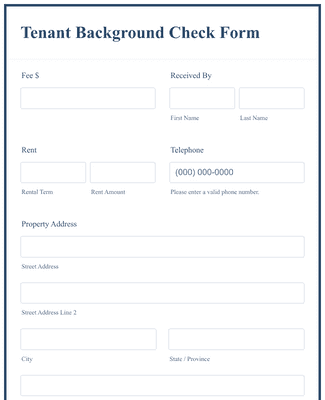Tenant screening and background checks are essential processes that landlords and property managers perform to evaluate potential tenants before approving their applications. These procedures allow landlords to make informed decisions and minimize potential risks associated with renting out properties.
The Importance of Tenant Screening
Tenant screening plays a crucial role in ensuring the safety and profitability of rental properties. By conducting thorough background checks, landlords can identify potential red flags and avoid problematic tenants who may pose various risks such as property damage, unpaid rent, or criminal activities.
Benefits of Tenant Screening
Reduced risk of property damage
Minimized chances of late or unpaid rent
Enhanced safety for other tenants and the neighborhood
Lower likelihood of legal disputes
Preservation of property value
The Screening Process
When performing tenant screening, landlords usually follow a standardized process that involves several key steps:
1. Application Form
Landlords typically request potential tenants to complete an application form, providing personal information, rental history, employment details, and references. This initial step allows landlords to gather basic information and assess the applicant’s eligibility.
2. Credit Check
Conducting a credit check enables landlords to evaluate the applicant’s financial responsibility and assess their ability to make timely rent payments. This process involves reviewing their credit score, credit history, and detecting any outstanding debts or financial issues.
3. Rental History Review
Reviewing the applicant’s rental history helps landlords identify any potential issues, such as eviction records, lease violations, or complaints from previous landlords. This step allows landlords to gauge the tenant’s reliability and track record as a renter.
4. Employment Verification
Verifying the applicant’s employment status and income helps landlords determine whether the tenant has a stable source of income to afford the rent. This process involves contacting the applicant’s employer to verify their position, duration of employment, and income stability.
5. Background Check
Performing a background check allows landlords to uncover any criminal records, sex offender registry listings, or other relevant legal information that might pose a risk to the property or other tenants. This step helps ensure a safe living environment for all.
Legal Considerations
While tenant screening is essential, it is crucial to conduct the process within the legal boundaries set by housing laws and regulations. Landlords must comply with fair housing laws that protect against discrimination based on factors such as race, religion, gender, disability, or familial status.
Conclusion
Tenant screening and background checks are vital for landlords and property managers to make informed decisions and protect their rental properties. By conducting comprehensive screenings, landlords can ensure the safety and profitability of their investments while providing a secure and desirable living environment for all residents.
